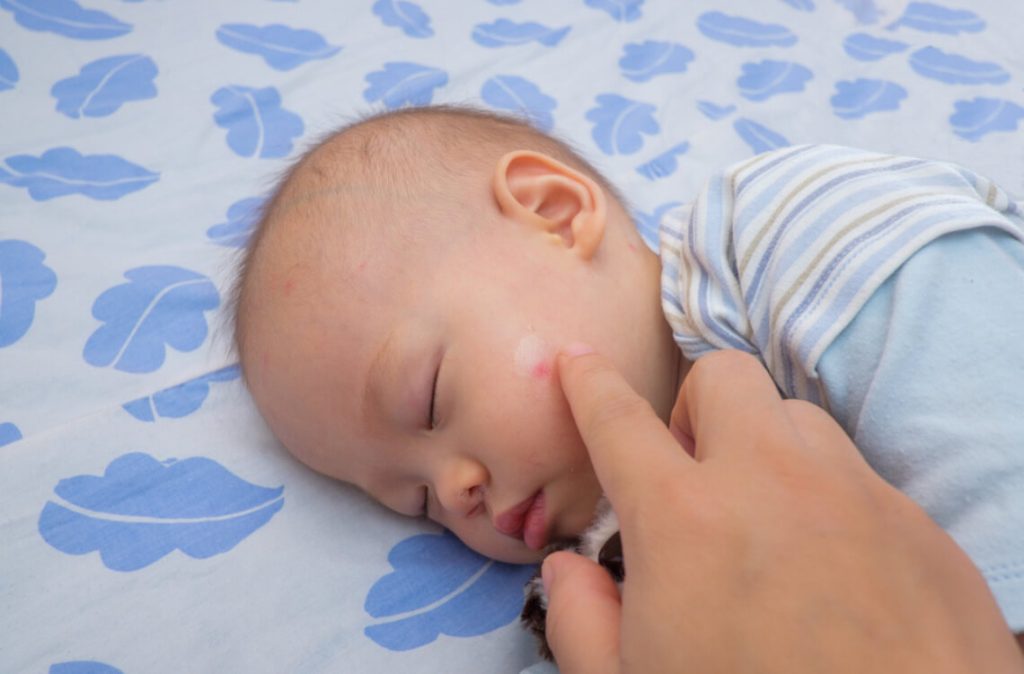As parents, our topmost concern is to ensure the safety and well-being of our little ones. A common problem is protecting them from mosquito bites, which can lead to discomfort and potential diseases.
And so I’d like to share an extensive guide with all of you, wonderful parents, offering seven preventive measures and seven home remedies to combat mosquito bites on babies.
Preventive Measures to Avoid Mosquito Bites on Babies
1. The Advantage of Light-Colored Clothing
Surprisingly, the colour of your baby’s clothing can make a noticeable difference! Mosquitoes are more attracted to dark colours as they can see dark objects clearly from a distance.
Therefore, simply dressing your baby in light-coloured clothing can significantly reduce their visibility to mosquitoes.
In addition, consider long-sleeved shirts, trousers, and socks to cover as much skin area as possible, thus reducing the risk of any unprotected skin being exposed to those pesky creatures.
2. Navigating The World of Baby-Safe Insect Repellents
Despite being small creatures, mosquitoes can be a big problem.
Thankfully, there exists a solution in the form of baby-safe insect repellents.
Repellents with a low concentration of DEET are deemed safe for babies older than two months, yet they remain effective against mosquitoes.
Nonetheless, caution is advised when using them. Make sure to follow the instructions on the label, and consult your paediatrician if you’re unsure about anything.
3. Investing in Mosquito-Proof Bedding
As the popular saying goes, “As snug as a bug in a rug.”
However, we certainly don’t want those bugs to be mosquitoes!
Investing in a high-quality bed bag or mosquito net can provide extra protection for your sleeping angel.
This small addition to your baby’s crib can prevent annoying mosquito bites, ensuring a peaceful sleep for your baby (and perhaps for you too!)
4. Constructing a Mosquito-Free Fortress
Removing mosquitoes from your home environment can play a crucial role in protection.
A thorough check to eliminate stagnant water sources from the surroundings can significantly reduce mosquito breeding grounds.
Installing screen doors and windows can also serve to keep out insects, effectively setting up a physical barrier between mosquitoes and your precious bundle of joy.
5. Timing is The Key
While allowing your baby outdoor playtime is essential, it’s equally important to be mindful of the time.
Since mosquitoes are most active during dusk and dawn, it’s advisable to avoid outdoor activities during these times.
If unavoidable, take extra preventive measures like full-cover clothing and infant-safe mosquito repellents.
6. Trusting Nature’s Solutions
Mother Nature provides great solutions that can be a great alternative for people wary of chemical repellents.
Certain plants, such as citronella, lavender, and basil, have mosquito-repelling properties. Similarly, essential oils such as lemongrass, eucalyptus, and others can be diffused in your home to keep away these pesky pests naturally.
7. Maintaining a Clean Play Area
Babies are curious little beings, constantly exploring their environment.
Regularly inspecting the play area for bits of food, spilled drinks, or stagnant water, which may attract mosquitoes, is necessary.
Ensuring there are no gaps in the playpen through which mosquitoes can infiltrate is another strategy that can pay off in managing a mosquito-free play zone.
Home Remedies to Cure Mosquito Bites on Babies
1. The Healing Power of Aloe Vera
Aloe Vera is well-renowned for its soothing and healing properties. Its gel offers a cooling effect that can significantly relieve the irritated skin caused by mosquito bites.
The application process is simple: scoop some gel from an aloe vera leaf and gently apply it to the bitten area.
2. Calling upon Kitchen Resources: Baking Soda
The baking soda you use in your kitchen can rescue you when dealing mosquito bites.
When applied to the affected areas, a simple paste mixed with baking soda and water can reduce itchiness and swelling, offering much-needed relief for your little one.
3. Using a Cool Compress
The benefits of using a cool compress are often underestimated. Just a few minutes with a cool compress can offer instantaneous relief to an itchy bite.
Remember to wrap the compress with a cloth before application to avoid placing anything too cold directly on your baby’s sensitive skin.
4. Elevation: A Simple But Effective Technique
If the mosquito bite is located on one of your child’s limbs, elevate it.
This aids in reducing the swelling by diverting the blood flow away from the bitten area.
Not to mention, it’s a perfect excuse to cuddle and soothe your baby.
5. Being Vigilant with Lymph Nodes
Any changes in your baby’s lymph nodes could indicate an infection. Look for any signs of discomfort or swelling in your baby’s lymph nodes.
Consult with a doctor immediately if anything seems unusual or concerning.
6. The Art of Distraction
An effective way to prevent your baby from scratching the bite and risking an infection is to distract them.
Engage them with a toy, a story, or their favourite song or game.
Their focus will shift from the irritating mosquito bite to the enjoyable distraction, potentially saving many tears and discomfort.
7. Knowing When to Seek Medical Help
Should your child develop severe symptoms such as fever, breathing difficulties, large or increasing areas of swelling, or hives following a mosquito bite, it’s best to seek medical help immediately.
It’s better to err on the side of caution regarding your baby’s health.
Now that you’re armed with the best preventive measures and home remedies, you’re more than prepared to protect your baby from the inconvenience and risk mosquitoes pose. Always remember, prevention is always better than cure!
Disclaimer: The information provided in this article is for informational purposes only and should not be considered as medical advice from Motherhood. For any health-related concerns, it is advisable to consult with a qualified healthcare professional or medical practitioner.
For more insightful stories and fun recipes, stay tuned to Motherhood Story!
